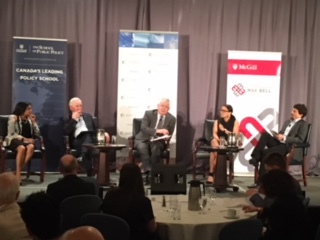"Freedom of speech" has been a topic that is receiving increasing speculation. In Canada's Charter of Rights and Freedoms it states:
"The Canadian Charter of Rights and Freedoms guarantees the rights and freedoms set out in it subject only to such reasonable limits prescribed by law as can be demonstrably justified in a free and democratic society.
Everyone has the following fundamental freedoms:
(a) freedom of conscience and religion; (b) freedom of thought, belief, opinion and expression, including the freedom of the press and other media of communication; (c) freedom of peaceful assembly; and (d) freedom of association."
The caveat is detailed within the first paragraph; "subject only to such reasonable limits prescribed by law as can be demonstrably justified in a free and democratic society". Rempel's argument is based on the assumption that the media is biased against conservative thought/speech/beliefs. "Bias" though, suggests a reluctance to take into account another's point of view rather than refusing to regurgitate actual lies.
Take, for instance, the federal Conservative Party's claim that "Justin Trudeau is charging Canadians over $90,000 to upgrade his summer home". That sounds a lot different than "$90,000 worth of upgrades to be completed on 60 year-old parliamentary residence". The latter is true. The former is sort of true, it's just missing valuable information such as; the alternate residence, or "summer home" is an official residence, and is currently the main residence used to host official business as 24 Sussex, also an official residence, is under renovation. The latter, however, wouldn't make people as angry.
A recent Pew Research project asked over 5,000 Americans to classify 10 statements as either fact or opinion. The results revealed that Americans who self-identified as having "high political awareness" correctly identified factual statements 36% of the time. The same group was able to identify opinion statements 44% of the time. People who self-identified as having "low political awareness" were able to correctly identify factual statements 17% of the time and opinion statements 29%. If you think back to exams, what does it mean to receive "44%" (or less)? Fail.
There is something very wrong if the class average is a fail. The problem is that if people cannot distinguish between personal opinion and fact, there needs to be more accountability upon those who are sending out the information. For those who want an everyday example, look to the Calgary and Edmonton SUN; directly under the names of columnists Rick Bell and Lorne Gunter you can see, written in bold, the word OPINION. This is accountability. Readers who have followed this blog will note that I began to include a similar disclaimer in recent posts.
Research is a skill. When my son was ignoring assignments in grade 7, the teacher and I had a conversation. As it turned out, the only assignments he was behind on were those that required internet research. I asked if they had taught the kids how to perform research on the internet. If the average inquiry in Google provides 649,000 results, how is he supposed to determine what information he should be using and including? I received this education in university because I graduated in 2013 when internet research was expected. Had I completed my degree the first time, in 2002, I might not have learned that.
People have been sounding the alarm since Trump showed up in American politics. A man who has zero regard for the truth, and even bragged about lying to Trudeau in their first meeting about trade, has one of the largest platforms in the world. Some journalists, and others, have taken to blaming Trump's "fake news" rhetoric for the recent mass shooting in a newspaper office. Alexandre Bissonette, the young man who killed six people in a Quebec Mosque, said he had to do something after Trudeau tweeted a welcoming message to potential immigrants and refugees because he didn't want immigrants to "kill (his) parents". Why would he think newcomers to Canada would do that?
Because opinion media like infowars and rebel media push a particular narrative to make money.
While people have the right to believe whatever they want and express opinions regarding those beliefs, certain individuals, groups and businesses, especially those who are purported to be "trustworthy" based on their position of authority or platform need to have accountability. And we, as consumers of information, should be able to demand the truth. We deserve it.
 |
| Deirdre Mitchell-MacLean Content Director/Writer countersigncanada.ca |
As of June 30, I have moved to a website http://countersigncanada.ca/blog/
I should have mentioned that earlier. My apologies.



















